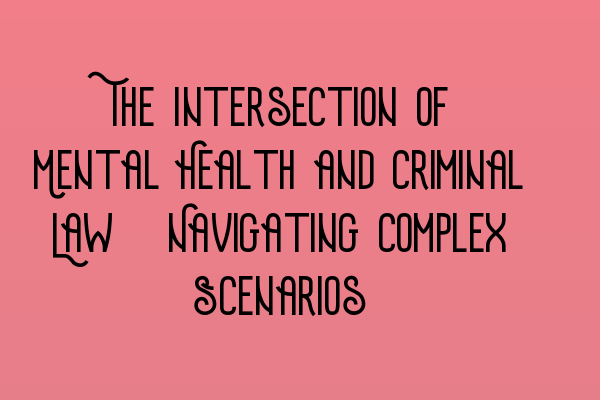The Intersection of Mental Health and Criminal Law: Navigating Complex Scenarios
When it comes to the field of criminal law, there is a complex and often overlooked aspect that must be taken into consideration – mental health. The intersection of mental health and criminal law presents unique challenges for legal professionals, as they must navigate the delicate balance between ensuring justice is served and addressing the underlying mental health issues of the individuals involved.
Understanding the Complexity
Mental health issues can play a significant role in criminal cases, influencing a person’s behavior, decision-making abilities, and overall state of mind. It is important for solicitors and legal professionals to have a thorough understanding of mental health and its impact on criminal behavior in order to effectively navigate these complex scenarios.
One of the key challenges faced by legal professionals is identifying when mental health issues may be at play in a criminal case. This requires a deep understanding of the signs and symptoms of various mental health disorders, as well as the ability to recognize how these disorders may manifest in criminal behavior.
Implications for Criminal Justice System
The intersection of mental health and criminal law has significant implications for the criminal justice system as a whole. It raises important questions about the appropriate punishment and treatment of individuals with mental health disorders.
Solicitors must advocate for their clients by ensuring that their mental health is taken into consideration during sentencing and throughout the legal process. This may involve seeking expert testimonies to provide insight into the client’s mental state and how it may have influenced their behavior.
Furthermore, solicitors must also work closely with mental health professionals to ensure that individuals with mental health disorders receive the necessary treatment and support they need. This may include advocating for alternative sentencing options, such as diversion programs or specialized mental health courts, that can address both the criminal and mental health needs of the individual.
Building Strong Cases
When mental health is a factor in a criminal case, it is crucial for solicitors to build strong cases that take into account the complexities of the intersection between mental health and criminal law.
By utilizing expert testimonies from mental health professionals, solicitors can strengthen their arguments and provide a more comprehensive understanding of their client’s circumstances. These testimonies can shed light on the underlying mental health issues and how they may have influenced the client’s behavior at the time of the alleged offense.
Additionally, solicitors must have a deep knowledge of mental health laws and regulations in order to effectively represent their clients. This includes understanding the legal standards for determining competency, assessing mental health defenses, and advocating for appropriate treatment options.
The Way Forward
The intersection of mental health and criminal law presents unique challenges for legal professionals. However, by staying informed, building strong cases, and advocating for the rights and needs of individuals with mental health disorders, solicitors can navigate these complex scenarios with professionalism and compassion.
For more information on related topics, check out our articles:
- SQE Exam Prep: Essential Study Materials for Aspiring Solicitors
- Expert Testimonies in UK Courts: Building Strong Cases
- Demystifying the Solicitors Qualifying Examination Format
- SQE Exam for International Lawyers: Challenges and Success Strategies
- LLC Formation Made Simple: Step-by-Step Guide for UK Entrepreneurs
